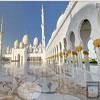
By Catherine Shakdam
While Saudi Arabia has been active in portraying its war in Yemen as one of liberation - a concerted effort to bring democracy and political self-determination to this poorest nation of the Arabian Peninsula, months of brutalities, indiscriminate bombings, war crimes and other aggravated human rights abuses are telling another story.
A story rooted in sectarian hatred and religious extremism; a tale of indoctrination and theological revenge against a people who stubbornly refused to bow to Wahhabism to instead remain true to the traditions of their forefathers - Zaidi Islam.
Hailing from Shia Islam, Zaidi Islam traces back to Imam Zaid the grandson of Imam Hussain, himself the son of Imam Ali.
Its history tied to House of Prophet Muhammad, Yemen northern region was born to Islam under the teachings of Imam Ali, the Prophet's son-in-law, cousin and designated spiritual heir. According to historical accounts it was Imam Ali who, in only three days, managed to convert the tribes of Hamdan (ancient Yemen) to Islam, when others before him, including Khalid bin Walid, one of Islam's most respected warriors failed after months of injunctions.
And while this little known fact might appear meaningless for many, for Yemen and its people, this long ago pledge of allegiance came to embody their own faith and their own link to Islamic traditions. In the Highlands of Yemen, the memory of Hamdan lives on within its sons - defiant, loyal and above all courageous to a fault.
It is this history, this heritage and this bond Saudi Arabia wants to eradicate.
Undisturbed by international law and human decency, the kingdom wants to deny Yemen its past to better rebuild its future to its own theocratical image, under the banner of Wahhabism. To do so it would stop at nothing - Just as Wahhabi militants raided and ransacked the holy city of Medina and Karbala in the 18th century to better stamp its religious deviance over Arabia, Al Saud is too here conducted a religious crusade against Shia Yemen - this time, its intent remains cloaked in treachery and political manipulations.
As the world marveled this July at the discovery of an ancient Quran at the University of Birmingham, almost no mention has been made of the oldest ever copy. As it happens this Quran, which dates from the 640s and therefore was put together only a few years after the death of Prophet Muhammad (632), sits in the heart of Yemen capital: Sana'a.
Every day since March 25, Sana'a has endured countless air raids over its skies. Entire neighborhoods have been erased from the map, hundreds if not thousands of bodies: men, women, children, have been buried under the rubbles of their homes. Hospitals, aid agencies, schools and other civilian infrastructures have been mercilessly targeted by Saudi Arabia's war planes.
But maybe most disturbing and telling of all - Mosques have been marked for destruction by Riyadh. Centuries old Mosques have been obliterated under Saudi fire. Yemen's religious history has become the unwarranted target of the kingdom's ire.
The world's oldest Quran risks now to forever disappear.
Juan Cole, an American academic and commentator on the modern Middle East wrote the following on the matter: "This \[discovery of the Quran in Sana'a] was an exciting idea to me, since at that time a lot of skepticism had been raised by John Wansbrough, Michael Cook, and Patricia Crone about whether the Qur’an as a book was really assembled 610-632, or whether it evolved over a couple of centuries. There was nothing wrong in principle with their theory– it was just an application of Descartes’ method, of radical doubt. And at that time the history of the Qur’anic manuscript text as a discipline barely existed (it is still very undeveloped compared to e.g. biblical studies). These authors turn out to have been wrong, but this is how science progresses, by people making bold hypotheses and then seeing if they can be knocked down."
Sana'a's heritage is linked to Islam and destroying Yemen simply equates to erasing part of Islamic history - beyond the moral implications of such barbarism undeniably lies a crime against humanity.
Many would be as bold as to qualify Saudi Arabia's action in Yemen as a religious genocide.
For a nation which pride itself in officiating as the Custodian of the Two Holy Mosques, the kingdom, or rather Al Saud has shown little interest in protecting Islam's historical, cultural and spiritual legacy - quite the opposite.
With Yemen it is really the foundations of Shia Islam in Arabia which Al Saud is trying to shake; it is not just the annihilation of a people King Salman seeks but instead the death of an entire religious school of thought. The very religious pluralism which Islam gave birth to, the tenets of tolerance, peace and compassion the Scriptures have carried for all those centuries stand now to be negated.
Just as the Prophet of Islam warned all those centuries ago: “There will appear in my community a group that reads the Qur’an. Your recitation will be like nothing compared to theirs, your prayers will be like nothing compared to theirs, your fasting will be like nothing compared to theirs. They will read the Qur’an and think it supports them but it will be against them. Their prayers will not go beyond their throats. They will leave the fold of Islam as an arrow leaves the bow.”
And so they have come and so they should be named for what they carry - treason to the Words and death.
source : abna













